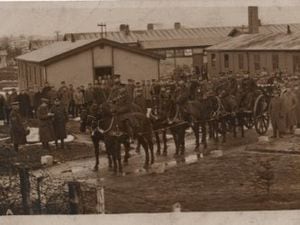HIV and Aids memorial is unveiled in Birmingham
A memorial to honour those lost to Aids and those living with HIV has been unveiled in Birmingham.

The Birmingham Aids and HIV Memorial will be permanently positioned in Hippodrome Square in the city’s Southside district.
Over 12 months in the making, the concept of the memorial came from Birmingham businessman and the designer of the monument, Garry Jones.
Having lived with his own experience of the Aids epidemic, Garry was inspired into action, along with others, after watching the Channel 4 1980s set drama It’s a Sin.
From here, they set out to establish a dedicatory space in Birmingham to remember those lost to HIV.
The six-metre-high sculpture, fabricated by well-known Black Country sculptor Luke Perry, features two entwined red-ribbon hearts positioned to represent an ‘embrace’.
As it weathers, one of the heart ribbons will begin to corrode and rust, representing the millions lost to HIV; meanwhile, the other is painted red to symbolise those individuals currently living longer and healthier lives with the virus.
Councillor Mariam Khan, health and social care cabinet member for Birmingham City Council, said: “The Red Ribbons memorial is a reminder of loved ones lost to Aids and HIV, but also the importance to end the stigma around blood-borne viruses.”
Dr Stephen Taylor, clinical lead for 'Birmingham Fast Track Cities +' initiative, and HIV consultant at Birmingham Heartlands Hospital, said: “The new Aids and HIV Memorial in Birmingham city centre not only acts a memorial to those we have lost to HIV in the last 30 years, but it can also act as a focal point to change the attitudes toward HIV moving forwards.
"The only way we can hope to eliminate HIV in Birmingham is to educate the public of the need to get tested, that means addressing the stigma that still surrounds HIV that stops people testing.
"If this new memorial can kick start these conversations and encourage people to get tested for HIV and other blood-borne viruses than can only be a significant step forwards towards achieving the ambitious targets of eliminating all new cases of HIV, Hepatitis B, C and TB by 2030.”





